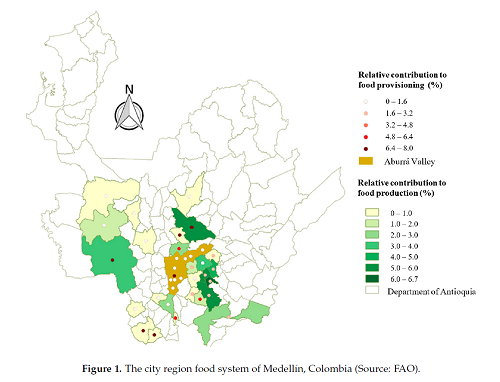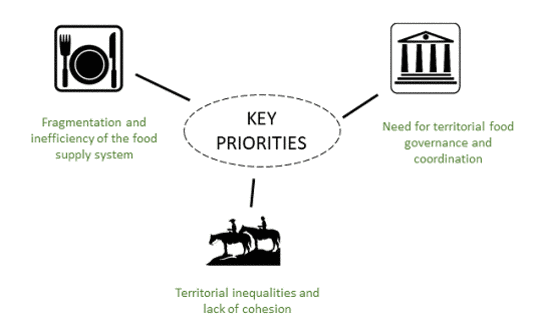Medellin, Colombia
Background
Colombia is Latin America’s third largest economy. Although it is largely agrarian, its economy is based on exports of petroleum, coffee and cut flowers. Due to its various agro-ecological zones, the country is able to grow a large range of products. Medellín, Colombia’s second largest city, is located in a fertile area ideal for livestock raising and for growing bananas, coffee beans, rice, cassava and sorghum. During the last decade, Medellín has been active in promoting good urban practices, supporting a fair food policy and engaging in sustainable urban practices.
The city region of Medellin
The department of Antioquia, in Colombia, where Medellin is located, is made up of 125 municipalities grouped into 9 subregions. The definition of the city region was based on the social, economic and political dynamics around the food system associated with Medellín and its Metropolitan Area (region called Valle de Aburrá) which is constituted by ten municipalities, in which 59% the population of Antioquia resides.
The city region is constituted by 31 municipalities belonging to 5 subregions. It has been defined according to 5 Criteria: 1) Municipalities of greater production (> 1% of the total of Antioquia); 2) Municipalities of greatest contribution to supply (> 1% of the total supply to Medellin and Valle de Aburrá); 3) Proximity, (the territories to the interior of the Aburrá Valley that presently agricultural production); 4) Zones with potential for agricultural expansion; 5) Institutional offer: the role of some municipalities in the promotion of food governance and territorial inclusion.

Main challenges and opportunities for the Medellin City Region Food System
- Fragmentation and inefficiency of the food supply system: There are limited direct relationships between rural and urban spaces, with lack of interaction among producers, marketers and consumers. As consequence the food provisioning systems in and around the city of Medellín is quite inefficient. There is considerable food loss and waste and limited market regulation for prices. Therefore, there is need to strengthen food production in the peri-urban areas of cities in the Medellín city region, as well as by improving linkages between urban food demand (especially from lower-income neighbourhoods) and cooperatives of small agricultural producers in the city region. Public administrations should focus particularly on improving the logistical infrastructure of markets and creating ‘food hubs’ for local food to enter and be distributed throughout the city.
- Territorial inequalities and lack of cohesion: There are significant social and economic territorial inequalities between urban, peri-urban and rural areas. In that respected it is important to build more capacity and cohesion in the territory by providing training and education to improve sustainable territorial food systems in the city region. Strengthening of the CRFS requires new knowledge and capacities among involved actors and stakeholders, ranging from farmers to entrepreneurs engaged in local marketing and food processing and those engaged in reducing food losses and revaluing waste. This action should bring together different training and educational organisations (universities, local NGOs, government agencies) to develop a joint training programme.
- Need for territorial food governance and coordination: There is need to facilitate the establishment of inclusive food governance mechanism that could address the complexity of the food system in the city region of Medellin, to generate political, administrative and economic synergies in order to facilitate the implementation of actions in the city region.

The way forward
- Establish the “ Alianza por el Buen Vivir” : A new governance structure and institutional platform are planned, in which different public authorities – including the Municipality of Medellín, the Metropolitan Area of the Valley of Aburrá (a collaboration of ten municipalities with strong environmental competences and responsibilities) and the provincial government of Antioquia – collaborate. This tripartite governmental platform on territorial food policy issues, called the “Alianza por el Buen Vivir” (the “Alliance for Good Living”), is intended to serve as a space and mechanism for coordination and articulation of the collective development and implementation of territorial policy and project interventions in the Medellín food system. With the final aim to promote territorial cohesion and equity, by creating employment opportunities, building capacities and relations.
- Promote regional public procurement: It is proposed to initiate the project of public procurement for Antioquia region where it is sought to strengthen the capacities of smallholder family farmers to produce and access markets and inputs, and more specifically: Promote and facilitate effective access to markets for agricultural products from family farming; Promote mechanisms aimed at strengthening the capacity to adapt to climate change, communities and productive systems.
- Promote the creation of “food hubs”: Renovate the Campo Valdes food market into a regional food logistics centre or “food hub” within the city. This would make the urban food market more accessible for producer associations in the rural areas around Medellín, and regulating the role of intermediaries would allow these fresh products to reach consumers at much more accessible prices.
Know more wait
|





